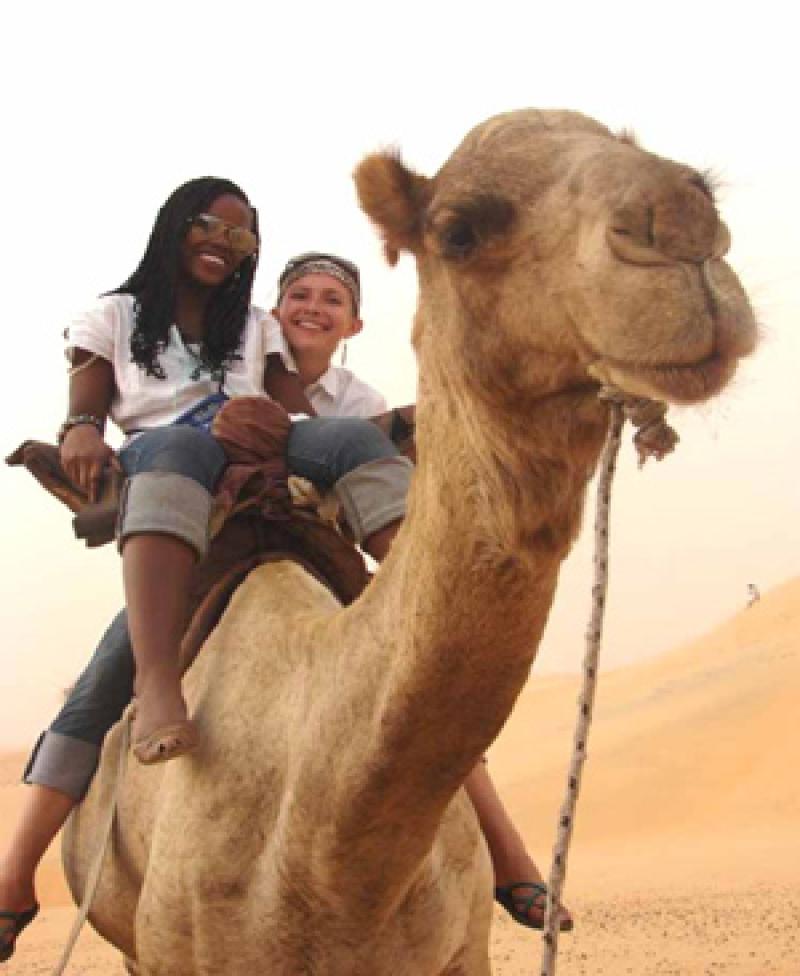Individual Decision Making & Economic Growth in South Africa and Kenya
Devyn Paros

‘Last January, I took off to Dakar, Senegal to spend four months studying abroad through the University of Minnesota’s Studies in International Development Senegal program. Majoring in French and International Development, I couldn’t have found a program more suited to my interests and goals.
My trip started off great in no small part due to the phenomenal staff at the West African Research Center (WARC) where we studied. They helped us make the most of our home stays, classes, and internships – they also organized amazing field trips! During the first half of the program I took classes in French, Wolof, international development, micro- business and alternative economies.
Our teachers were all practitioners in some area of development, which provided a unique opportunity to learn about more practical aspects of what it is like to work in a developing country on issues including education, health, the environment, and the economy.
The more exciting part came during the second half of the semester when I interned at a local microfinance institution. I worked with both INAFI (International Network of Alternative Finance Institutions) and one of their local partners, FDEA (Women’s Enterprise Development in Africa) that works primarily with female clients. At INAFI, I studied current challenges in the microfinance sector, like mission drift and social performance management.
I coupled this research with fieldwork at FDEA and learned about microfinance from a practitioner’s perspective. Shadowing credit agents, I spent days running around different neighborhoods, visiting clients in the markets and at their homes. I also attended credit committees, where credit applications are vetted. Overall, I walked away having a better understanding of the different forces at play in an NGO that has an obligation to both a social and financial mission–they can definitely be difficult to balance.
Outside of the classroom, I traveled throughout Senegal, making trips to the cities of Saint Louis, Djoudj, Lompoul and Toubacouta as well as to the southern region of Casamance. I miss Senegal enormously, my host family most of all. Some of my most memorable moments were learning how to cook Senegalese food, attending a traditional wrestling match, following the African Cup, and spending time in my family’s region of origin, where I got to participate in a wedding.
In return, I shared some American traditions with them; pumpkin pie, pancakes, barbecue sauce and American football. It was an unforgettable experience and I can’t wait until I get the chance to go back to visit my family and friends. Until then, thank goodness for Skype!
The photo shows me riding a camel with fellow student, Zawadi Baharanyi, in the Lompoul Desert. The picture was taken by Tiana Hallberg.
I presented my research at the 2009 Denman Forum. My research advisor was Prof. Kelechi Kalu. The project is entitled “Individual Decision Making and Economic Growth in South Africa and Kenya. Here is my abstract:”
Research Abstract
Sustained economic growth has long been identified as crucial to political and economic development. However, economic growth remains a challenging goal for African countries that struggle to attract foreign direct investment (FDI). Prior research focuses heavily on variables like state structures and institutions to explain economic development. That approach tends to disregard the impact of individual level or personal factors on development policies.
This research seeks to evaluate whether individual decision-making explains why some countries succeed at achieving economic growth through investment and others do not. Methodologically, this will be done by comparing South Africa and Kenya.
South Africa benefits from consistently high levels of FDI, sustained growth, a well-developed market and the highest GDP in Africa. In contrast, Kenya has low GDP, stagnant growth and low levels of FDI. While these countries share violent colonial legacies, political unrest and ethnic diversity, they also benefit from diverse natural resources and ready access to international markets. Nevertheless, South Africa and Kenya have progressed at vastly different rates.
Theoretically, I plan to use Ruth Lane’s politics model to analyze individual decision-makers in South Africa and Kenya, emphasizing Kenyan President Mwai Kibaki and former president Thabo Mbeki of South Africa. Lane’s politics model emphasizes the role of individual decision makers in understanding policy outcomes. She insists that conclusions drawn at the state level should be analyzed as being the result of individual interactions rather than products of the system as a whole.
To evaluate the effects of individual decision-making on economic growth, I will first examine how the leaders’ decisions and agendas impact their countries’ political and investment climates as well as their ability to attract and maintain FDI. Given that investment does not guarantee growth per se, this project also seeks to explore the role of decision makers in how they deploy FDI to achieve economic growth. Although my research is in progress, conclusions drawn based on individual-level analysis will have distinct relevance to African states, governments and citizens, where strong leaders seem to be more at the center of economic development policies compared to more established political institutions and structures in developed nations like the United States and France.
Learn more about the Denman Forum.
Learn more about Fulbright teaching opportunities.
